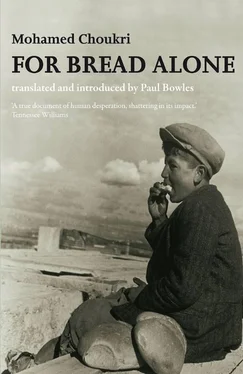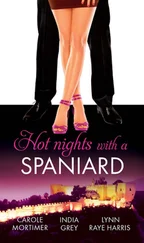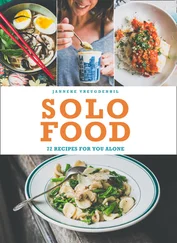When I told Asiya that it was I who had hidden her pyjamas, she chased me. I can jump over things that she has to go around. I turned to look. She had almost caught up with me. I stumbled and fell, and she fell on top of me. I tried to get up, but she had hold of me. Again we rolled on the ground. Then she stopped the game, looking suddenly ashamed. I thought: I too am going to be stronger than a woman.
I use up a great many boxes of matches pursuing my newest pastime. I sit on the edge of the tank and wait for the eels to come out of the crevices at the bottom of the tank. I twist five or six wax matches together, light them, and throw them at the moving eels. Still tossing matches, I follow their frantic course until they wriggle back into their holes. The sight of the small flames falling in the air together with the undulating movements of the eels, these things calm my resentment and anxiety.
I sat there now as usual, tossing bunches of matches into the water. One bunch fell out of my hand before I was able to throw it. I made another bunch and lighted it, without looking to see what had become of the first, which had landed on the ground. Next I heard the sound of canes crackling. I tried to put the fire out by throwing rocks at it, but it only blazed higher. Then I ran and hid in the stable. I heard voices crying for water, and burrowed deeper into the hay, pondering my bad luck. When night came, I crept into the stall where the cows slept. I made one of them stand up, and I patted her head and smoothed her hide. Then I rubbed her udder, and she let me suck on it. After three days of fear and watchfulness in the lanes and alleys of the quarter, and three nights of milk-sucking in the security of the stable, I fell into the trap my father had set for me. The neighbours had to break the bolt on our front door in order to deliver me and my mother from the blows of his military belt. My body was covered with bleeding welts, and one of her eyes was swollen shut. It was many nights before I could find a comfortable position to sleep in. I longed to be able to sleep in the air. My wounds hurt, my bones ache, and I can feel the fever burning in my head.
I went back to get drunk and smoke kif in the café. There I saw Fatima, the café owner’s daughter, bending over as she did the washing, with her clothing hitched up under her sash in front. She seemed older now, and bigger and stronger than I, and I looked at her with longing. My father’s rough treatment of me always served only to increase the rage of my desire. The girl turned towards me with a smile. I looked at her, and in my mind’s eye I see a gust of wind arrive, and lift her filmy garments. Asiya is prettier than she is. But Fatima is in front of me. She stood up straight and stretched. Then she put her arm behind her back, wincing a bit. I was staring wistfully at her full bare thighs. Quickly she let her skirts fall to cover her knees.
I imagined myself going over to her and slapping her in the face. Then I would pull the skirt up again, and she would yank it down angrily. I would hit her again and lift it up. She would scream with rage, and I would set her clothes on fire. The flames as they burned her underwear delighted me.
Suddenly she demanded: What is it?
Disappointed, I said: There’s no more sugar in the café.
She looked at me piercingly. Don’t you know where we keep the sugar?
I glared at her.
What’s the matter with you today? she said, staring at me. I did not reply, and she added: You’re strange today.
I went into the storeroom with my head bent over, and came out with the sugar. She was still studying me with concern.
I began to invent reasons for going into the house when she was there alone. Using the fire of my imagination I found that I was able to undress her whenever I liked. She grew used to my unnecessary arrivals, and I to her feigned indifference. We hypnotized one another, each looking into the other’s eyes. At this point we spoke very little. Our mutual understanding grew, intensified.
One cold night I found my body warming itself beside hers, and she said nothing. We warmed one another and slid on top of each other, face over face, face under face. I slap her cheek to hear the sound it makes. I bite her so her blood will run out. I pretend to stab her, in order to hear the groan I had heard my mother make. And for the first time I understood that girls had something wonderful and delicious, and that, whatever it was, I needed it.
My mother gave birth to a baby. Little sister Khemou was growing big enough to take care of little brother Achor. One evening at the café I was smoking kif and getting drunk on wine, sitting outside the door in the fresh air. When my eyes were open I saw the stars in the sky, and when they were shut I saw the stars in my head. The café keeper noticed me sitting there, and said with annoyance: Serve that man a glass of water.
I looked at him dreamily, and in my mind cursed him. The son of a whore! The stars in my head went out. I said: And you? What are you doing here? Give it to him yourself.
He slapped my face. Then he spat at me. I began to laugh without control. One of the kif -smokers cried: Can’t you see he’s kiffed and drunk?
That was my last night at the café. I went off into the dark with the night birds whistling in my head, feeling both light and heavy. Walking on the earth was like flying. I was not afraid of the cane-brakes along the road, or of the horrors that might be behind them. In order to feel even drunker I began to sing:
Ya Tetuan, ma ahlak
Tol omri ma ninsak
Tol hayatia ahouak .
I came across a cat, or maybe a rabbit, as I ran in the darkness through the narrow lanes. It could have been a djinn pretending to be a cat for all I cared.
About a week after the Aid el Kebir I went with my mother to the stream that ran at the bottom of the orchard. She wanted to wash the hide of the sheep we had sacrificed. Later, when we were at home that night, she exclaimed: Allah! I left the knife down there on the rock. The one I was scraping the sheepskin with.
I said nothing, but ran out through the orchard to the stream. I found the knife, and seized it as if I were going to throw it at an adversary, at the same time glancing across to the other bank of the stream. And I saw a djinn advancing towards the water. Like everyone else, I knew that if you see a djinn , you must pierce the earth with a steel blade where you stand. With a violent gesture, I threw the knife downward. I tried to run, but my knees failed me. I fell and got up again. I could neither cry out nor turn my head. It seemed to me that if I turned and looked, I would see the monster beside me. I kept slipping and falling and getting up again, until I reached the house, my heart in my throat. As a result I fell ill, got worse, and actually came near to dying. An old man visited the house, a specialist in exorcizing evil spirits from human bodies. The old man accomplished a miracle. He told my mother to sacrifice a black rooster and to carry me seven times around the well in the courtyard. In this way I began after a few days to return to my normal self. When I was well again I told my friends what had happened. All of them believed me implicitly. Both the older and the younger ones knew all about djenoun . In those days one thing could all too easily turn into another. Whatever djinn might appear, or whatever mere hallucination suggest itself to them, they understood that it came from Allah in direct accordance with their own personal merit or lack of it.
My father now found me a new job in a brick factory, where I earned twenty-five pesetas a week, pushing a wheel-barrow full of clay or bricks back and forth for eight or nine hours a day. At first my hands were covered with blisters. Later the blisters turned into callouses. My face became hard and my body strong.
Читать дальше












